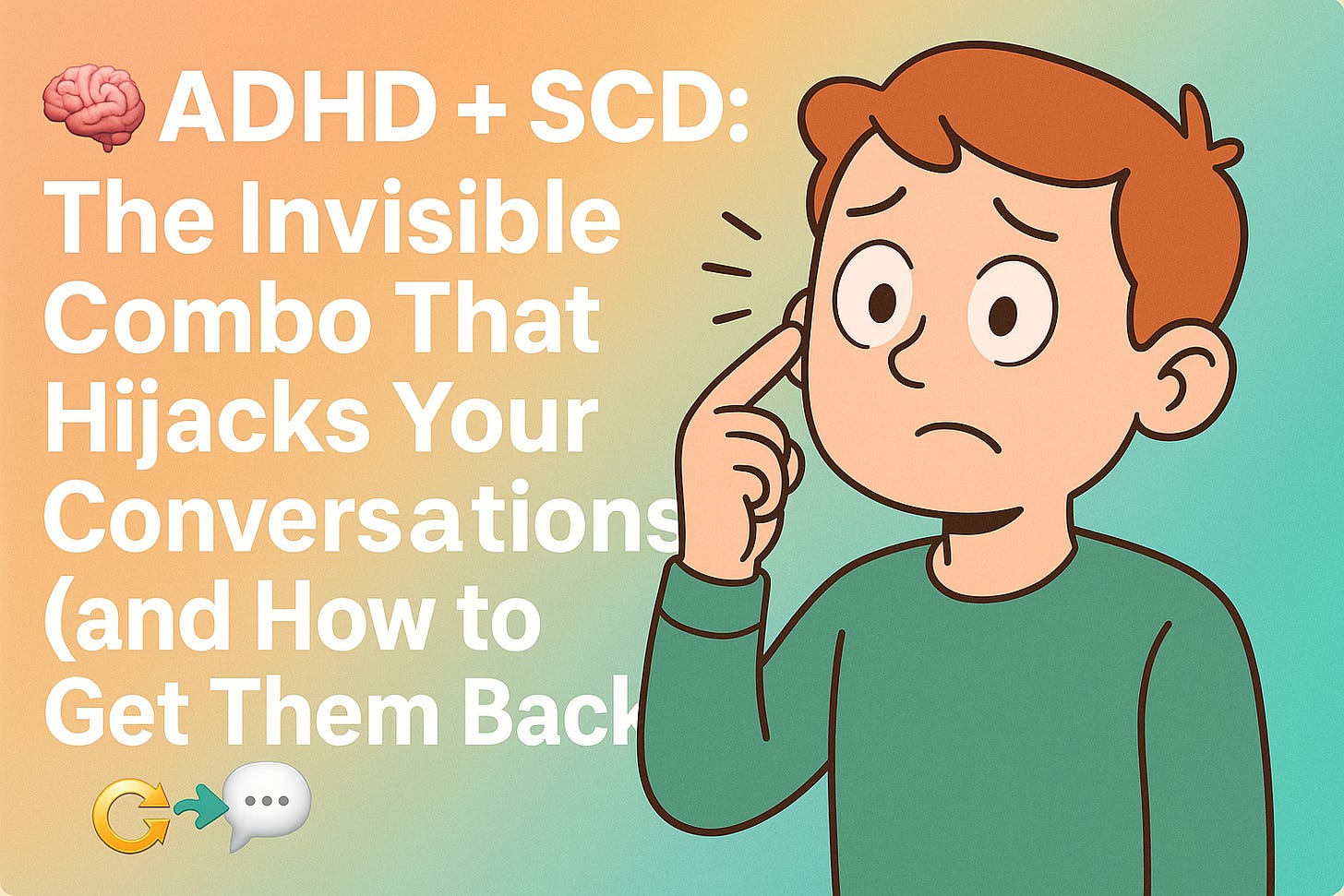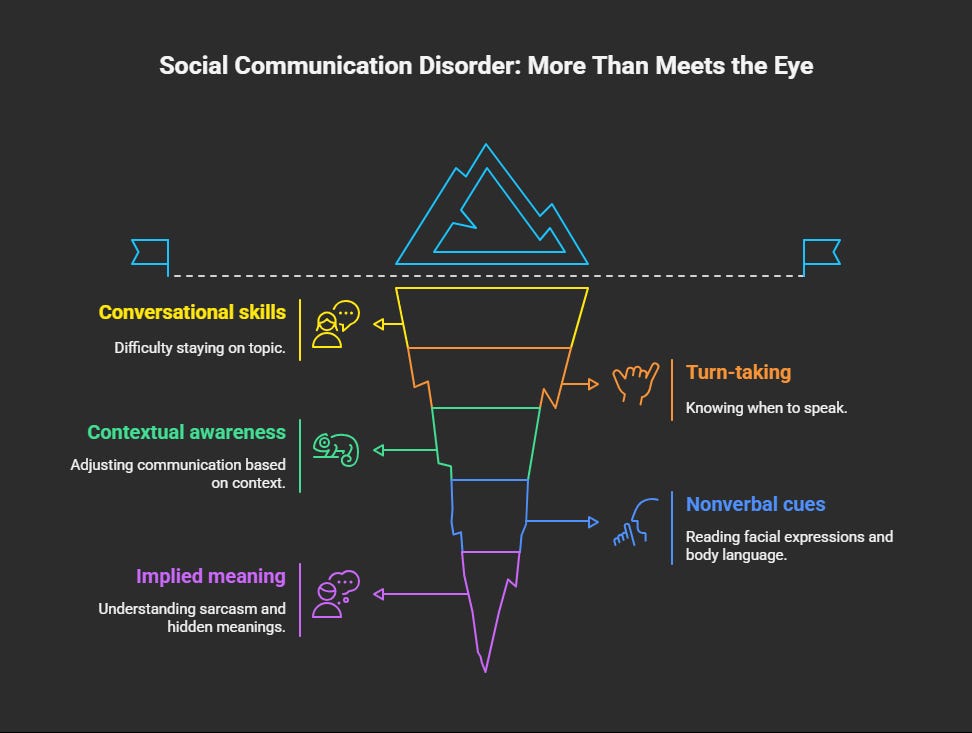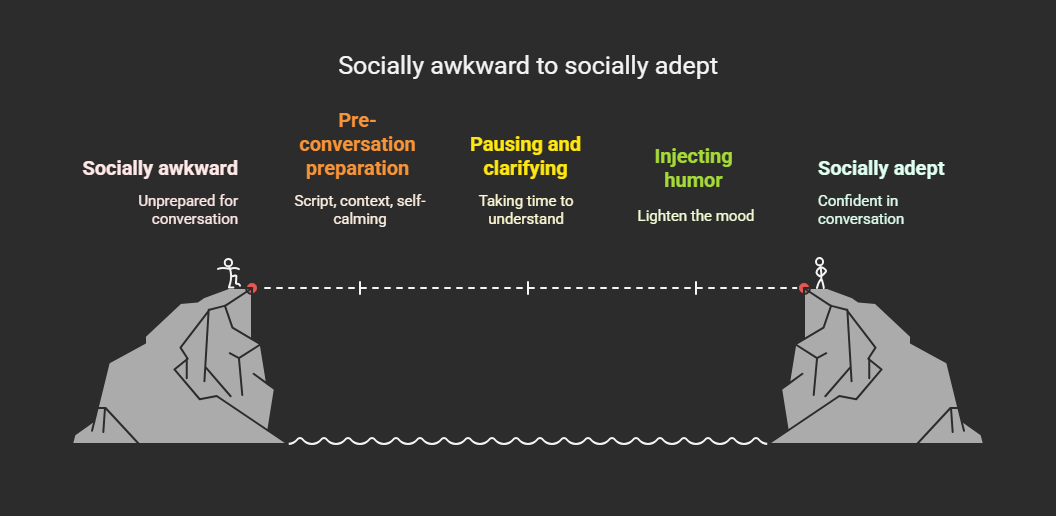🧠 ADHD + SCD: The Invisible Combo That Hijacks Your Conversations (and How to Get Them Back) 🔄💬
🧩 Because knowing what to say shouldn’t feel like decoding a secret language.
🌪️ The Hidden Struggle You’re Not Imagining
You walk into a conversation…
Your mouth opens—and suddenly, your thoughts vanish.
Or worse: they tumble out, unfiltered, overshared and misunderstood.
💬 You walk away replaying it over and over:
“Did I talk too much?”
“Did they get that I was joking?”
“Why is this so hard for me?”
"I just wanted to say the right thing... why did that feel like a social minefield?"
Welcome to the dual-brain battle of ADHD + Social Communication Disorder (SCD).
Two invisible forces. One overwhelmed nervous system.
You’re not broken. You’re running two operating systems at once.
Let’s unpack what that means and what to do.
📘 What You’ll Learn
🧠 What is SCD and how it overlaps with ADHD
🔁 How this combo impacts daily interactions
🧬 Linked science + brain-based reasons
🎬 Real-life Before/After scenario
✅ Communication strategies that actually work
🛠️ Linked tools & supports (not just “try harder”)
📋 Quick Action Plan for daily use
💬 Final pep talk + your next steps
🧠 What Is Social (Pragmatic) Communication Disorder?
SCD is a neurodevelopmental condition that affects your ability to use language in a socially appropriate way.
People with SCD struggle to:
🗣️ Stay on topic in conversations
🔄 Know when it’s their turn to speak
📏 Adjust tone, volume or language based on context
🧍 Read nonverbal cues (like sarcasm or facial expressions)
🧭 Understand implied meaning (“Oh, that’s great” = sarcasm?)
🔬 Scientific Link:
Understanding the overlap between ADHD and Social Communication Disorder (SCD) helps explain many confusing behaviors. These challenges aren't about intent, but about how the brain is wired.
📉 Executive Function Breakdown
ADHD weakens the brain’s self-regulation system.
👉 It’s harder to pause, observe, and respond with intention.
🧠 This part of the brain, primarily the prefrontal cortex, handles planning, impulse control and decision-making. When it's not working efficiently, you may act before thinking, struggle with transitions or miss key social details.
🔗 Learn more: CHADD - Executive Function and ADHD
🗣️ Social Processing Gaps
SCD affects the brain’s ability to notice or interpret social cues,
like eye contact, tone of voice or the pacing of conversations.
👀 You might miss when someone is joking, feel unsure when to speak or accidentally come off as rude or distant.
🔗 Learn more: Social Communication Disorder - ASHA
🎭 Masking & Shame
Years of feeling "off" in social situations can lead to masking—
👤 Overcompensating to seem "normal", often at the cost of authenticity and mental energy.
😔 Shame builds up after repeated "awkward" moments and many end up avoiding social contact altogether.
🔗 Learn more: Psychology Today - The Cost of Masking in ADHD
💣 Rejection Sensitivity
Even subtle or imagined criticism can feel like an emotional explosion.
💥 This is called Rejection Sensitive Dysphoria (RSD), a common but under-recognized trait of ADHD.
📌 It can cause intense emotional reactions, sudden mood swings or even social withdrawal to avoid future rejection.
🔗 Learn more: ADDitude Magazine - What Is RSD?
🔄 ADHD + SCD: A Complex Combo
Now add ADHD:
🌪️ Inattention
🔊 Verbal impulsivity
🎢 Emotional dysregulation
🌀 Executive dysfunction
Suddenly, you're not only missing cues—you’re missing the breaks, the map and the filter.
⏰ When It Strikes: Sneaky Social Sabotage
💬 1:1 conversations — You interrupt, overshare, or struggle to follow
🎙️ Meetings or interviews — You ramble, zone out, or talk off-topic
👥 Group chats — You misread sarcasm or tone
📱 Texting — You obsess over wording or emoji use
🎉 Social events — You freeze, blurt things or replay convos for hours
🛌 Right before bed — That one thing you said five years ago? Hello again. 😬
“Was I too much?”
“Did I say that out loud?”
💡 Key internal signs:
Dread before socializing
Rumination after
A deep fear of being misunderstood
🔥 Impact: How This Combo Affects Real Life
🙅 Misinterpreting sarcasm or jokes
🗯️ Talking too much, too fast or too intensely
🙊 Avoiding social events for fear of messing up
🤐 Withdrawing after perceived social failure
💣 Overthinking every conversation for hours
💬 Losing friendships or job opportunities due to “awkwardness”
🔍 Studies show adults with both ADHD and SCD are more likely to experience social anxiety, depression, and isolation.
👉 PubMed Study on ADHD + Pragmatic Deficits
👉 Journal of Communication Disorders: Pragmatics and ADHD
🔍 Strategies for ADHD + SCD Combo
Navigating social life with ADHD and SCD isn’t about being someone else — it’s about building the right tools for your brain. Below, you'll find strategies grouped by type, to help you focus exactly where you need support.
1️⃣ Cognitive strategies 🧠
Approaches that help you shift thought patterns and better understand social situations.
🌀 Reality Reframing — When your brain says “That was awkward,” reframe it to “That was just different.” Train your mind to stop catastrophizing.
🧾 Mental Scripts — Having simple phrases ready like
“Let me think” or “Can you clarify?” gives your brain time without panic.
🎬 Social Decoding Practice — Watch a short scene on YouTube or Netflix. Pause. Ask: “What emotions are they showing? Was that sarcasm? Why did they say that?”
🔍 Socratic Questions — When anxiety kicks in, gently ask:
“What’s the evidence I messed up?” and “What would I say to a friend who thought this?”
🔢 The Rule of 3 — Instead of spiraling into worst-case thoughts, come up with three possible interpretations, not just the scariest one.
2️⃣ Behavioral Strategies⚙️
Habits and actions that make everyday communication smoother.
⏳ Pause Practice — Build in a 3-second pause before responding. You can tap your finger, take a breath or mentally count to three.
🎭 Conversational Roleplay — Practice chatting with someone safe. Focus on taking turns, reading cues and shifting topics gently.
📝 Bullet Point Prep — Before a call or meeting, jot a few key ideas. Helps you stay on track and avoid tangents.
💬 Social Decompression — After social time, chat with a trusted friend or journal what went well and what felt off. This rewires shame spirals.
❓ One Clarification Rule — When confused, ask just one direct question like:
“Wait, do you mean ___?” It keeps conversations manageable.
3️⃣ Social Strategies🫂
Tips to build supportive, low-pressure social connections.
🛟 Safe People List — Identify 2–3 people who feel calming, not draining. Spend your social energy there first.
🤝 Communication Agreements — Try simple agreements like
“Let me know if I interrupt” or “Sometimes I miss tone, just flag it.” Builds safety.
📲 Text Buffering — Use texting to warm up before a call or debrief after.
You’re not avoiding — you’re scaffolding communication.
🗣️ Meta Language — Be open: “I sometimes miss sarcasm or tone — let me know if I do.” You’d be surprised how people appreciate honesty.
🎲 Structured Hangouts — Choose hangouts with built-in focus: board games, coworking, nature walks. Less pressure = more fun.
4️⃣💖 Emotional Strategies
Support for shame, anxiety and building self-trust.
📓 Post-Interaction Journaling — After conversations, write down: what went well, what confused you, how you handled it. Watch for patterns and growth.
🧘♀️ Self-Compassion Breaks — Say things like: “I’m learning.” “I’m allowed to be awkward.” “Trying is brave.” Repetition helps.
🛠️ Rejection Recovery Plan — Prep a plan for tough social days: music, texting a friend, funny videos, or even dancing it out.
🧠 Name the Feeling — Instead of “I’m terrible at this,” say “I’m feeling anxious.” Labeling feelings separates them from identity.
🏁 Celebrate Micro-Wins — Did you clarify instead of masking? Stay present in a convo? That’s a win. Track the small victories.
5️⃣ Environmental & Tool Strategies 🧩
Change your setup to support your communication style.
🗺️ Visual Social Maps — Draw out typical conversations, emoji tone guides or decision trees. Seeing it makes it less overwhelming.
🎙️ Voice Memo Practice — Record yourself saying things you find hard. Listen back, tweak tone or pacing. Practice builds confidence.
📆 Time Block for Recovery — Don’t stack intense interactions. After a draining call or hangout, block time for rest or stimming.
📱 Tech Aids — Use tools like Speechify for voice rehearsal, Moodnotes for emotional tracking, or LifeAt.io for coworking zones.
🗒️ Sticky Note Cues — Place notes where you need them:
“Pause. Breathe. Be curious.”
“You’re not awkward. You’re human.”
“You’re doing fine.”
6️⃣ One minute social reset 🧘♂️
Feeling spiraly after a social interaction?
Try this short reset:
1️⃣ What did I actually say?
2️⃣ What’s a kinder interpretation of what happened?
3️⃣ What do I need right now?
(💤 Rest | 🤗 Reassurance | 🗣 Feedback | 🎧 Distraction)
🎬 Before & After: The Conversation Spiral
🚫 BEFORE: The Glitch
You're in a Zoom meeting.
You interrupt someone by mistake.
You apologize too much.
Then you ramble trying to explain your point.
You later message a colleague:
“Sorry, that was awkward. I’m bad at this.”
Result: You feel embarrassed. You avoid speaking next time.
✅ AFTER: With Strategies
Same meeting.
You interrupt → pause → say: “Oops, sorry, go ahead.”
You use a bullet point in chat to clarify your thought.
You body double with a coworker post-call to debrief.
You take a breath. You handled it. Not perfectly—but with intention.
✅ Action Plan: How to Support Yourself Daily
🧠 Pre-Convo Prep
🧾 Script common phrases: “That’s interesting, can you say more?”
🧭 Know your context: Meeting? Social event? Text? Adjust tone.
🧘♂️ Self-calm line: “I can be socially awkward and valuable.”
💬 In the Moment
Pause 3 seconds before replying
Clarify: “Did you mean that literally or jokingly?”
Humorize it: “My brain runs its own commentary—I’m still catching up.”
🧰 Practical Tools
🛠️ Speechify – Read social guides aloud to rehearse
🛠️ Lifeat.io – Body doubling for emotional grounding
🛠️ VoiceThread – Practice conversation timing visually
🛠️ Moodnotes – Track emotions post-convo
🛠️ Time Timer – Time management during social situations
🧠 ADHD-SCD Toolbox
🛠️ Speech therapy for pragmatic language
🧠 CBT for social anxiety + executive dysfunction
🧩 Autism-informed coaching, if overlaps exist
📱 Apps: Speechify | Lifeat.io | Habitica (structure + feedback loop)
📋 Visual tools: emotion cards, convo flow charts, whiteboards
📋 Quick ADHD + SCD Rescue Cheatsheet
When you feel a post-convo spiral, try:
🔹 Name what triggered the shame
🔹 Reality-check: “Was this awkward or just different?”
🔹 Ask for clarity or feedback
🔹 Text a friend: “Did that make sense?”
🔹 Reframe: “Being thoughtful is not a flaw.”
📚 Further Resources
📘 “Unmasking Autism” – Devon Price
📘 “NeuroTribes” – Steve Silberman
🔬 NIH: Pragmatic Language Profiles
🔥 Final Thought
If socializing feels like coding in a language you almost understand—
You’re not failing. You’re adapting to a neurotypical world with a neurodivergent rulebook.
Every time you pause, clarify or just show up anyway, you’re winning.
💡 Whether you explain too much, too little, or go silent, your voice matters.
You deserve communication that feels safe, clear and yours.
💬 Let’s Talk!
What’s one social moment you still replay in your head?
👇 Drop it in the comments below.
This is a no-shame zone. Let’s untangle it together.
👉 Like this? 🔁 Share with a friend who overthinks convos too
👣 Follow ADHD Wisdom Tools
💌 Subscribe for more bilingual brain strategies every week
You got this!
Rgds,
Lud













i suffer far more with RSD than SCD. i definitely experience the issues with interruption and being “appropriate”, but sarcasm and body language are second nature for some reason. though i’m oldish so those things could have been learned through masking?
i always feel awkward and i’m absolutely too blunt/honest for some people.
for example: don’t ask me a question you don’t want the answer to because i don’t do small talk well. if you ask how i’m doing i will tell you. if you ask if your outfit is flattering i will answer honestly. i’m always kind but i’m not always “nice” according to arbitrary standards.
i’m also pretty consistently told that i’m being rude when i’m just upset and advocating for myself.